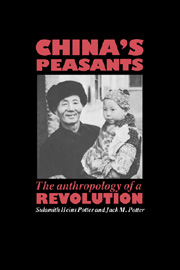Book contents
- Frontmatter
- Contents
- List of illustrations
- List of tables
- Preface
- Notes on the text
- Map 1 China
- 1 The old “feudal” order: Zengbu before Liberation
- 2 Establishing the new order
- 3 The ordeal of collectivization
- 4 The Cultural Revolution
- 5 Maoist society: the production team
- 6 Maoist society: the brigade
- 7 Maoist society: the commune
- 8 Impatient aspirations: transition to the post-Mao period
- 9 The cultural construction of emotion in rural Chinese social life
- 10 Marriage, household, and family form
- 11 Chinese birth planning: a cultural account
- 12 Lineage and collective: structure and praxis
- 13 Party organization
- 14 The party ethic: a devotion born of distress and enthusiasm
- 15 A caste-like system of social stratification: the position of peasants in modern China's social order
- 16 The Chinese peasants and the world capitalist system
- 17 The crystallization of post-Mao society: Zengbu in 1985
- References
- Index
4 - The Cultural Revolution
Published online by Cambridge University Press: 02 December 2009
- Frontmatter
- Contents
- List of illustrations
- List of tables
- Preface
- Notes on the text
- Map 1 China
- 1 The old “feudal” order: Zengbu before Liberation
- 2 Establishing the new order
- 3 The ordeal of collectivization
- 4 The Cultural Revolution
- 5 Maoist society: the production team
- 6 Maoist society: the brigade
- 7 Maoist society: the commune
- 8 Impatient aspirations: transition to the post-Mao period
- 9 The cultural construction of emotion in rural Chinese social life
- 10 Marriage, household, and family form
- 11 Chinese birth planning: a cultural account
- 12 Lineage and collective: structure and praxis
- 13 Party organization
- 14 The party ethic: a devotion born of distress and enthusiasm
- 15 A caste-like system of social stratification: the position of peasants in modern China's social order
- 16 The Chinese peasants and the world capitalist system
- 17 The crystallization of post-Mao society: Zengbu in 1985
- References
- Index
Summary
The Cultural Revolution was essentially a revitalization movement, a kind of millenarian movement designed to purify, intensify, and apotheosize. Its purpose was to restore the mystical vitality of the revolutionary process, which had been vitiated by practical disappointments, and to regain a lost sense of power. In its pure form, it lasted roughly from 1966 to 1969 in Zengbu. (See J.Chen 1975, Myrdal and Kessle 1970, Rice 1972, and Selden 1979, for general accounts of the Cultural Revolution; for a closer comparison with Zengbu, see the accounts of Chen village by Chan, Madsen and Unger 1984, and by Madsen 1984.) The initiative for this movement was Chairman Mao's. Ideologically, the issues at stake were similar to the issues of the Great Leap Forward: was China to strive directly for the most purely communist social forms, or would it be more expedient to temporize? The years 1962–6 had been years of temporization, under the influence of President Liu Shaoqi and his followers. Mao considered these policies to be “following the capitalist road.” He thought that they would result in the re-emergence of economic classes, and that they were intrinsically counterre-volutionary for this reason. He opposed the routinization of the party's revolutionary charisma, which would take the mantle of power from dedicated Communist fighters and revolutionaries like himself and give it to professional specialists, technicians, and bureaucrats. Although his awesome prestige, authority, and charisma as China's leader had been weakened by the partial failure of his Great Leap Forward policies, it had by no means been destroyed.
- Type
- Chapter
- Information
- China's PeasantsThe Anthropology of a Revolution, pp. 83 - 93Publisher: Cambridge University PressPrint publication year: 1990
- 1
- Cited by



